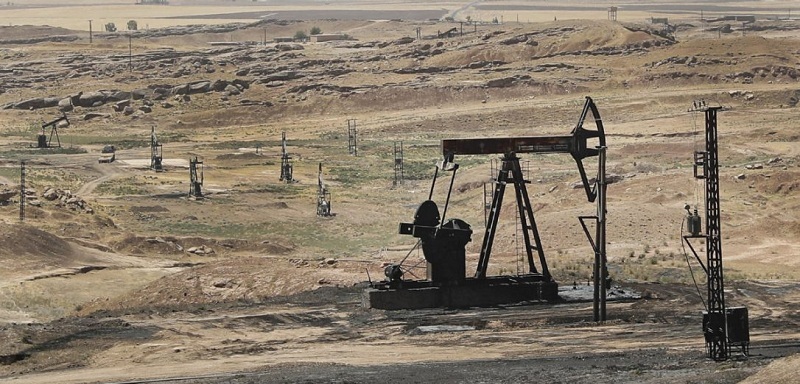Alwaght- The so-called Syrian Democratic Forces (SDF), the backbone of which are the Kurdish People’s Protection Units (YPG), last week managed to seize from ISIS terrorist group the northern city of Raqqa after three years of occupation. They also seized on Sunday the richest oilfield of Deir ez-Zor, also a Syrian city with largest oil reserves that has been under the ISIS siege for three years. Capturing the al-Omar oilfield coincided with advances towards the same oilfield of the government forces who came under an ISIS counterattack that pushed them back. Under these conditions, the US-backed SDF managed to seize the oil installations, a development triggering public opinion's speculations about possible American deal with the terrorist group to keep the government forces away.
Anyway, the Predominantly-Kurdish SDF are now in command of a large al-Omar oilfield of Deir ez-Zor that earlier served as ISIS major source of income as the terrorist group made money through smuggling oil out of the country.
According to some analysts, the move comes as a response to the Iraqi army’s retaking of the oil-rich city of Kirkuk from the Kurdistan Regional Government in north of the country on Friday following the "unconstitutional" independence referendum and can provide the Syrian Kurds with opportunities and challenges.
First opportunity is a financial one. By taking control of the oilfield, the Kurdish forces now have a significant source of income to fund their fight and separatist agendas. Potentially capable of producing 9,000 oil barrels per day, the oil reserve can provide Kurds with cash flow in the future. If they manage to regularly operate the oil facility, they can do much to help shore up their strength. Moreover, holding the oilfield along with recent territorial expansion in Raqqa and Deir ez-Zor will open the Kurds' hands to connect the now autonomously-run Kurdish cantons of Afrin and Kobani that in a broader sense will pave the way for them to establish a united Kurdish region. More outcomes for the Kurds could be accessing the Mediterranean coasts and gaining enough clout to play effective role in Syria’s political developments in the future by involvement in the prospective negotiations. Moreover, oil wealth can embolden the Syrian Kurds to take a long step similar to the Iraqi Kurds towards possible final goal of founding an independent state in Syria’s north.
But their gains do not go without coming head to head with huge challenges. First challenge will certainly be at home. The central Syrian government will hardly approve to let oil as a major source of funding go under occupation of forces who have in head dreams of breakaway from Syria. Their secessionist dreams are now nearly confirmed as they support the Kurdistan Workers' Party (PKK) terrorist group. When the SDF pushed ISIS out of Raqqa, the Kurdish fighters raised huge posters of Abdullah Ocalan, the imprisoned leader of the PKK in Turkey in show of solidarity. The Syrian Kurds also backed the independence vote of Iraqi Kurdistan region held on September 25. This means that Damascus government will not sit with its arms crossed. Rather, it will act for regaining control of the energy-rich region from the SDF, though this can open a direct front this time with the Kurds.
Second challenge is regional, mainly posed by such regional countries as Iran and Turkey. Iran and Turkey frequently stress on importance of national sovereignty of Iraq and Syria. This is beside the Turkish sensitivity to establishment of a Syrian Kurdish autonomous rule that will border the Kurdish regions of Turkey in south of the country. Ankara leaders are afraid that the political convergence and links of the two Kurds on both sides of the border might pose territorial risks to Turkey.
The Turkish officials repeatedly maintained that they will not accept an independent Kurdish state or an autonomous region on their borders and will put all options, including the military action, on the table to check the Kurdish secessionism. Turkey’s military intervention in Syria, marked by last year’s Operation Euphrates Shield, came to address concerns about the Kurdish advances in the neighboring war-torn country. If the Kurdish forces' progression continues, a Turkish operation directly targeting them will not be unlikely. This Turkish antipathy comes while the Kurds need access to the Mediterranean coasts to make use of the newly-controlled oil reserves, something simply unfeasible with a consideration of the Ankara's strong opposition to the Kurdish littoral access.
Third problem the Kurds might have ahead is international, in which powers such as the US and Russia are taking center stage. For now, the Washington-sponsored Syrian coalition serves as a pressing instrument against the Iran-led Axis of Resistance in the hands of the US. The SDF access to strategic regions and oilfields can give an upper hand to the US and its local allies and impair the position of the opposite side. Since the beginning of the Syrian conflict, Russia sustained considerable costs, which means the Russians will not only sit and behold the allied country’s energy wealth being looted by the Americans and their proxies.
If Russia decides to help Syria retake its Deir ez-Zor oilfields by force, clashes might erupt between the US-backed militants and the Syrian forces who have backing of the Resistance camp. This will escalate rejuvenated tensions in the region.
Therefore, the Syrian Kurds cannot only rely on the American help for holding the recently-seized Deir ez-Zor energy sites and Raqqa, and have to face a wide range of essential internal, regional, and international challenges. Additionally, the American sponsoring of them is far from being permanent as Washington help's main driven force is a desire for presence in Syria and domination of its oil reserves. If these drives are lost, the Americans will end their aids to the Kurds. All these lead to the conclusion that the Kurdish challenges seriously outnumber their opportunities even after the latest wins.



























